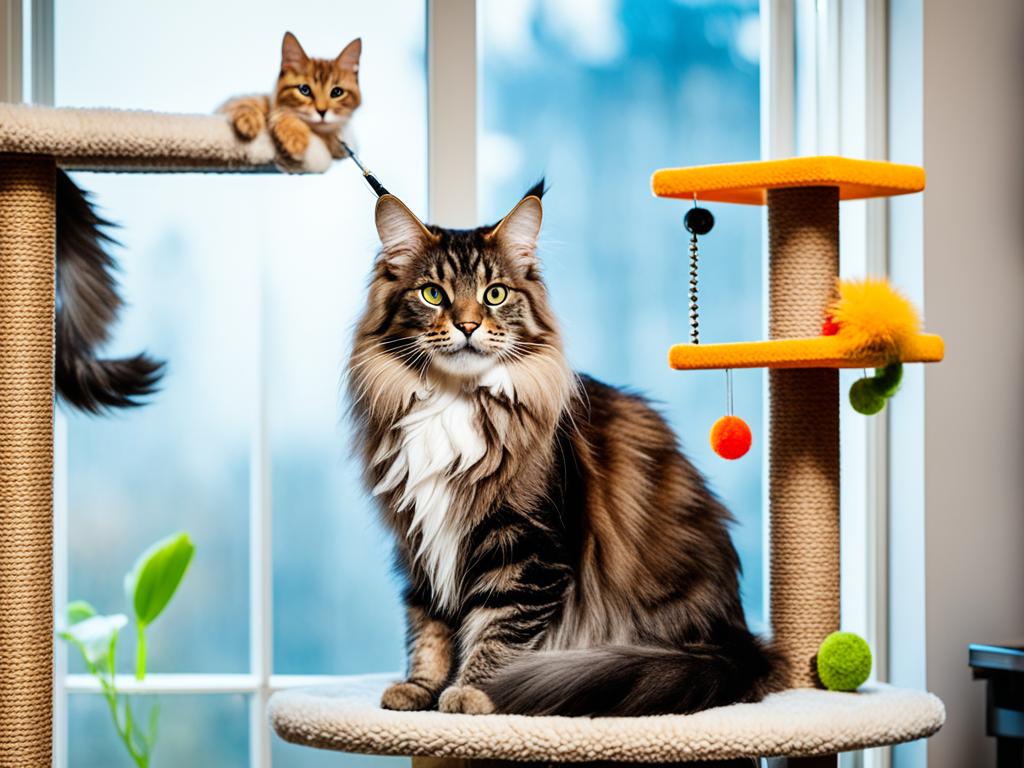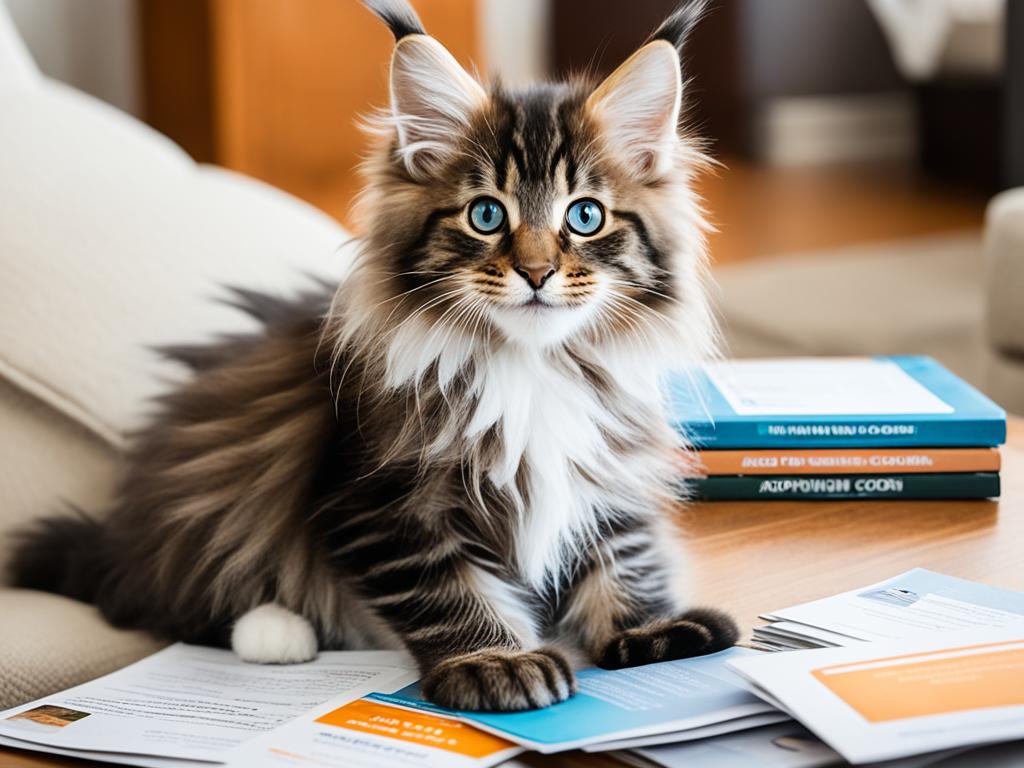The Maine Coon cat is a popular breed known for its large size, fluffy coat, and friendly personality. Adopting a Maine Coon involves understanding their unique characteristics, finding reputable breeders or rescue organizations, and preparing your home for a new furry family member. This comprehensive guide will provide you with essential tips and insights to ensure a successful adoption process and proper care for your Maine Coon cat.
Key Takeaways:
- Research reputable breeders or rescue organizations specializing in Maine Coons
- Ask about their adoption requirements and complete any necessary applications or references
- Prepare your home to meet the specific needs of a Maine Coon cat
- Allocate a budget for your Maine Coon’s care, including veterinary visits and grooming
- Be aware of potential genetic conditions and take preventive measures
Understanding the Maine Coon Breed
Maine Coon cats are known for their distinctive physical characteristics and friendly temperament. These beautiful felines possess large size, long fur coats, ear tufts, and fluffy tails, making them stand out among other cat breeds.
Maine Coons have a sociable nature, which makes them excellent companions for families. They enjoy the company of both humans and other pets, and their laid-back demeanor makes them adaptable to various living situations.
Originating in North America, Maine Coons are one of the oldest and largest domesticated cat breeds. They have a rich history and were first recognized as a breed in the late 19th century. Today, they are beloved pets who bring joy to countless households.
Proper Care for Maine Coons
To ensure the well-being of your Maine Coon, it’s essential to provide them with proper care. Here are some key aspects to consider:
- Regular grooming: Due to their long fur coats, Maine Coons require regular grooming to prevent matting and keep their fur in good condition. Brushing their fur at least twice a week can help reduce shedding and maintain their beautiful coat.
- Spacious living environment: Maine Coons are known for their size, so they need ample space to explore and play. Providing them with a spacious living environment, such as a large house or apartment with plenty of room to roam, is important for their well-being.
- Nutritional needs: Maine Coons have specific dietary requirements to support their overall health. Feeding them a high-quality cat food that meets their nutritional needs, including protein-rich formulas, is vital for their growth and development.
When considering adopting a Maine Coon, it’s crucial to research reputable breeders or adoption agencies that prioritize the health and well-being of the cats. Maine Coon adoption agencies can provide valuable information about the breed and guide you through the adoption process, ensuring a smooth transition for both you and your new furry friend.
| Distinctive Physical Characteristics | Temperament and Personality | Size |
|---|---|---|
| Large size | Friendly | One of the largest domesticated cat breeds |
| Long fur coats | Sociable | |
| Ear tufts | Adaptable | |
| Fluffy tails |
The Maine Coon Adoption Process
Adopting a Maine Coon involves a specific process. If you have set your heart on finding a Maine Coon kitten or cat to bring into your home, here are the key steps to follow:
Finding Reputable Breeders or Rescue Organizations
When looking to adopt a Maine Coon, it is important to search for reputable breeders or rescue organizations that specialize in the breed. Reputable breeders prioritize the health and well-being of their cats, while rescue organizations provide loving homes for Maine Coons in need.
Understanding Adoption Requirements
Each breeder or rescue organization may have different adoption requirements. It is crucial to ask about their specific process and criteria. Some may ask for references or require you to complete an application form to assess if you are a suitable adoptive parent for a Maine Coon.
Choosing the Right Maine Coon
Once you have been approved for adoption, you can start looking for a Maine Coon kitten or cat that fits your preferences and lifestyle. Keep in mind factors such as age, temperament, and compatibility with children or other pets. Take your time during this process to ensure a good match.
Preparing Your Home
Before bringing your new furry family member home, it is crucial to prepare your living space. Maine Coons require ample space to roam and play. Ensure you have designated areas for sleeping, eating, and playing. Consider investing in scratching posts, toys, and a cozy bed to make your Maine Coon feel at home.
Setting Aside a Budget
Adopting and caring for a Maine Coon also comes with financial responsibilities. It is essential to set aside a budget for their regular veterinary care, food, grooming supplies, toys, and other necessities. By planning ahead, you can provide your Maine Coon with the care they need without financial strain.
Maine Coon Adoption Checklist
Use the following checklist to ensure you are fully prepared for your Maine Coon adoption:
- Research reputable breeders or rescue organizations
- Ask about adoption requirements and process
- Choose a Maine Coon that suits your preferences
- Prepare your home for a Maine Coon
- Set aside a budget for their care
Adopting a Maine Coon is a rewarding experience that requires careful planning and consideration. By following the steps outlined in this guide, you can find the perfect Maine Coon companion and provide them with a loving forever home.
Caring for Your Maine Coon
Proper care for a Maine Coon cat includes providing a balanced diet, regular veterinary check-ups, grooming, and plenty of exercise and mental stimulation. Maine Coons require specific attention to their dental health, as they are prone to dental diseases. Regular grooming helps prevent matting and keeps their long fur healthy. Maine Coon cats are generally healthy but may be prone to certain genetic conditions such as hypertrophic cardiomyopathy and hip dysplasia. It’s important to be aware of these potential health issues and take necessary measures to prevent or treat them.
To ensure optimal Maine Coon cat care, here are some essential guidelines:
- Diet: Provide a balanced and nutritious diet that meets the specific dietary requirements of your Maine Coon. Consult with your veterinarian for recommendations on high-quality cat food.
- Veterinary Check-ups: Schedule regular visits to the veterinarian for vaccinations, preventive treatments, and routine examinations to detect any health issues early on.
- Grooming: Maine Coons have long, thick fur that requires regular maintenance. Brushing their coat at least once a week helps prevent matting and reduces hairballs. You can also consider occasional professional grooming sessions.
- Exercise and Mental Stimulation: Maine Coons are active cats that enjoy playtime. Provide them with toys, scratching posts, and interactive activities to keep them physically and mentally engaged.
- Dental Care: Pay close attention to your Maine Coon’s dental health by regularly brushing their teeth and providing dental treats or toys specifically designed to promote oral hygiene.
- Genetic Conditions: Maine Coon cats may be prone to certain genetic conditions, such as hypertrophic cardiomyopathy and hip dysplasia. It’s important to educate yourself about these conditions and work closely with your veterinarian to manage and prevent them.
Grooming Tips for your Maine Coon
Grooming is a crucial part of Maine Coon cat care. Here are some grooming tips to keep your Maine Coon looking their best:
- Use a wide-toothed comb or a slicker brush to remove loose hair and prevent matting.
- Pay special attention to the areas behind the ears, on the belly, and the hindquarters where matting is more likely to occur.
- Consider using a detangling spray or grooming powder to make brushing easier.
- Trim your Maine Coon’s nails regularly to prevent overgrowth and discomfort.
- Clean their ears gently with a damp cloth or specialized ear cleaning solution to avoid infections.
- Brush their teeth using a soft toothbrush and cat-friendly toothpaste to maintain good dental hygiene.
By following these care tips and providing the necessary attention and love, you can ensure that your Maine Coon cat lives a healthy and happy life.

Breeding and Genetics of Maine Coons
The Maine Coon breed is known for its fascinating history and unique genetic makeup. It is believed to have originated from domestic cats brought over from Europe and interbred with local wildcats in North America. This mix of different genes has contributed to the breed’s distinctive physical characteristics and friendly temperament, making it a favorite among cat lovers.
Responsible breeding practices play a crucial role in maintaining the Maine Coon breed’s traits. Reputable breeders adhere to strict standards to ensure the health and well-being of the cats. They conduct genetic testing to identify any potential genetic diseases and eliminate them from their breeding programs.
When considering adoption, understanding the breeding and genetics of Maine Coons is essential. It allows potential adopters to make informed decisions and select a healthy and genetically sound cat. Adopting from reputable Maine Coon adoption agencies ensures that the cats have undergone proper health screenings, providing peace of mind to the adopter.
By educating yourself about the breeding and genetics of Maine Coons, you can contribute to the well-being of the breed and provide a loving and caring home for your new furry companion. Maine Coon rescue organizations and adoption agencies are valuable resources for finding Maine Coons in need of forever homes, helping you embark on a rewarding journey of companionship with these incredible cats.
FAQ
What are the physical characteristics of a Maine Coon cat?
Maine Coon cats are known for their large size, long fur coats, ear tufts, and fluffy tails.
Are Maine Coon cats friendly and suitable for families?
Yes, Maine Coons are friendly and sociable animals, making them ideal for families.
What is the history of the Maine Coon breed?
Maine Coons are believed to have originated from domestic cats brought over from Europe and interbred with local wildcats in North America.
What is involved in the Maine Coon adoption process?
The Maine Coon adoption process includes finding reputable breeders or rescue organizations, meeting their adoption requirements, and choosing a suitable kitten or cat.
How should I prepare my home for a Maine Coon cat?
It’s important to have a checklist that includes providing a spacious living environment, ensuring enough resources for the cat’s needs, and setting aside a budget for their care.
What are the essential aspects of Maine Coon cat care?
Proper care for a Maine Coon cat includes providing a balanced diet, regular veterinary check-ups, grooming, and plenty of exercise and mental stimulation.
Are there specific health issues to watch out for in Maine Coon cats?
Maine Coons may be prone to certain genetic conditions such as hypertrophic cardiomyopathy and hip dysplasia. Regular veterinary care and genetic testing can help prevent or treat these conditions.
How can I find reputable Maine Coon breeders or adoption agencies?
Start by researching reputable breeders or adoption agencies that specialize in Maine Coons, asking about their adoption requirements and commitment to the health and well-being of the cats.
Are Maine Coon cats easy to groom?
Maine Coon cats have long fur that requires regular grooming to prevent matting and keep their coat healthy. It’s important to establish a grooming routine early on.
What should I know about the breeding and genetics of Maine Coons?
Responsible breeders perform genetic testing to avoid passing on certain genetic diseases to future generations. Understanding the breeding and genetics of Maine Coons is crucial for adoption and long-term health.

Leave a Reply